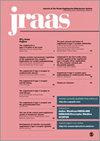Could angiotensin-converting enzyme 1 I/D polymorphism be a modificator of COVID-19 response in different populations, diseases, and/or conditions?
IF 4.1
4区 医学
Q3 PERIPHERAL VASCULAR DISEASE
Journal of the Renin-Angiotensin-Aldosterone System
Pub Date : 2020-07-01
DOI:10.1177/1470320320957157
引用次数: 3
Abstract
Creative Commons Non Commercial CC BY-NC: This article is distributed under the terms of the Creative Commons Attribution-NonCommercial 4.0 License (https://creativecommons.org/licenses/by-nc/4.0/) which permits non-commercial use, reproduction and distribution of the work without further permission provided the original work is attributed as specified on the SAGE and Open Access pages (https://us.sagepub.com/en-us/nam/open-access-at-sage). Dear Editor, Several articles recently discussed the potential relevance of the insertion/deletion (I/D) polymorphism in the angiotensin-converting enzyme 1 (ACE1) gene to COVID19 infection.1–4 Their data raise the possibility that the ACE1 D allele might be a protective factor in the spread and outcome of COVID-19 in various European, NorthAfrican, and Middle Eastern populations.1–3 However, data presented in the meta-analysis investigating the frequency of ACE1 D allele distribution in various European countries revealed that the frequency of that allele was the highest in the countries most severely affected by COVID19 infection, such as Spain, Italy, and UK.5 Specifically, the frequency of ACE1 D allele in Spanish, Italian, and UK general population was estimated at 63%, 58%, and 53%, respectively, while the total number of cases and deaths per million to date were 6328 and 606 for Spain, 3975 and 575 for Italy, and 4584 and 642 for UK.6 Those data suggest that higher frequency of the ACE1 D allele might be rather risk than protective factor in COVID-19 infection. Importantly, higher frequencies of ACE1 D allele in general Spanish, Italian, and UK populations are also accompanied by higher frequencies among the elderly individuals, who are at the same time the most vulnerable to COVID19 infection.5 In line with this, the relatively low frequency of the ACE1 D allele, estimated at 49%, observed in the general Croatian population5 might explain the rather favorable epidemiological situation in Croatia related to COVID-19 infection. Specifically, since the February 25 outbreak of the COVID-19 pandemic in Croatia, the total number of cases per million to date is 656, while total number of deaths per million is 26, suggesting that Croatia has been rather successful in overcoming COVID-19.6 In the past 15 years, our study groups have been investigating the possible relevance of the ACE1 I/D polymorphism in various diseases and/or conditions in the Croatian population. Most of our studies suggest that the ACE1 D allele as well as the ACE1 D/D genotype may be risk factors in multiple sclerosis,7,8 schizophrenia,9 and lung cancer.10 Importantly, we have also found that the risk effects of the ACE1 D allele and ACE1 D/D genotype were in general more prominent among male patients with multiple sclerosis7,8 and schizophrenia.9 Indeed, COVID-19 infection has previously been associated with sex,11 and a recent article discussing the angiotensin-converting enzyme 2 (encoded by the ACE2 gene), which has been known to cooperate with ACE1 in the renin–angiotensin system, hypothesizes that sex differences in COVID-19 severity may be related to the ACE1 and ACE2 genes.4 The aim of this communication is to emphasize the need for further investigation of the relevance of ACE1 I/D polymorphism in COVID-19 infection in different populations. Studies on the potential role of ACE1 I/D polymorphism in COVID-19 infection among individuals with different diseases and/or conditions are also warranted. Finally, it would be interesting to address the effect of ACE1 I/D polymorphism on COVID-19 infection based on age and sex as a confounders.

血管紧张素转换酶1 I/D多态性可能是不同人群、疾病和/或条件下COVID-19反应的调节因子吗?
本文章由计算机程序翻译,如有差异,请以英文原文为准。
求助全文
约1分钟内获得全文
求助全文
来源期刊
CiteScore
6.20
自引率
0.00%
发文量
16
审稿时长
6-12 weeks
期刊介绍:
JRAAS is a peer-reviewed, open access journal, serving as a resource for biomedical professionals, primarily with an active interest in the renin-angiotensin-aldosterone system in humans and other mammals. It publishes original research and reviews on the normal and abnormal function of this system and its pharmacology and therapeutics, mostly in a cardiovascular context but including research in all areas where this system is present, including the brain, lungs and gastro-intestinal tract.

 求助内容:
求助内容: 应助结果提醒方式:
应助结果提醒方式:


